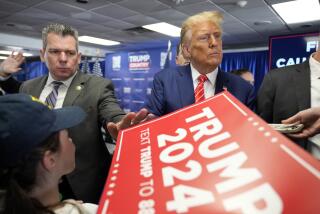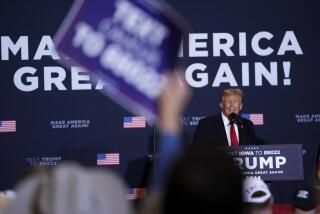President Touts Tax Cut, Defense at Iowa Whistle-Stop
- Share via
DALLAS CENTER, Iowa — President Bush, who lost Iowa to Al Gore in November by a mere 4,000 votes, worked the Midwest’s political landscape Friday--pitching his tax cut, missile defense and a baseball.
On his third trip to Iowa since becoming president, Bush returned to the farm where he had outlined his farm policy in September 1999. He reminded his audience that getting rid of the estate tax, as part of his overall $1.35-trillion tax cut plan, was one campaign promise he had already delivered.
Welcomed by several hundred people from rural central Iowa who had gathered in a sunny barnyard, Bush sowed a message of optimism.
Iowa traditionally is first to select its presidential nominees--and the first place a rebellion might be hatched if Bush runs for reelection in 2004 and faces GOP opposition.
Political activity already is noticeable: Recent or expected visitors include Bill Bradley, who sought the Democratic nomination against Gore; Sens. John F. Kerry (D-Mass.) and John Edwards (D-N.C.), who are said to be considering presidential runs; Atty. Gen. John Ashcroft, a potential Bush surrogate; and Terry McAuliffe, the Democratic National Committee chairman.
So Bush cultivated Iowa’s political fields Friday, extolling the massive tax cut he signed into law a day earlier and, in particular, the eventual abolition of the estate tax.
“The bill I signed [Thursday] recognizes that when you tax a person’s assets it’s unfair,” Bush said.
The estate tax “used to cause generation after generation to bear debt, to live under the heavy onus of having to borrow money to pay their taxes,” he said.
“In many cases,” he said, using the phrase favored by the Republicans for the estate levy, “the death tax caused one generation after another to try to climb out from underneath heavy debt. And those days are ended, as far as we’re concerned, in America.”
The president did not mention that the tax, which is being phased out, won’t disappear entirely until 2010--nearly two years after he would leave office even if he were to serve two terms.
Bush spoke from a stage erected in the neatly kept barnyard of Tom and Judy Barrett--shining green-and-yellow John Deere tractors and other farm equipment positioned to form a backdrop, a screened gazebo to one side and the just-greening cornfields in the distance.
He also pitched a missile defense plan, spoke up for his plan to ease the path for religious organizations to work with the government in delivering social aid and practically raved about the tenor of political cooperation back in Washington.
The stop in Iowa was the first in a day that saw Bush spend about half an hour watching a collegiate championship baseball game--between Stanford and Tulane in Omaha--where he threw the first pitch, and then go on to his ranch near Crawford, Texas, for the weekend.
The stops allowed Bush to evoke the down-home, wholesome image of life in America’s heartland: “It’s nice to be back on the farm,” he said.
He worked the theme into his speech, pointing out that in the campaign he had said the tax code should “respond to people who make good choices.”
“A good choice is being married,” Bush said. “And we did something about the marriage penalty in the tax code.”
The president portrayed the tax legislation as “the beginning of the change of the tone in Washington, D.C.”
But there remains some bickering, name-calling and unnecessary shrillness, he said, adding: “Sometimes I catch some of those elected officials, maybe not saying things about me that my mother would like to hear. . . . But the tone is changing.”
The stop at the ranch precedes Bush’s first trip overseas as president.
“I cannot wait to describe to the people of Europe, the leaders in Europe, how important it is for freedom-loving people to think differently about how to keep peace,” he said.
With Russia no longer considered an enemy, Bush said, “we shouldn’t be locked into a Cold War mentality that says we keep the peace by blowing each other up.
“In my attitude, that’s old, that’s tired, that’s stale.”
Touting his proposal that defense be structured on the ability to shoot down missiles rather than launch nuclear payloads against an attacker, the president said the threats to the U.S. now come from “biological and informational warfare.”
More to Read
Sign up for Essential California
The most important California stories and recommendations in your inbox every morning.
You may occasionally receive promotional content from the Los Angeles Times.













